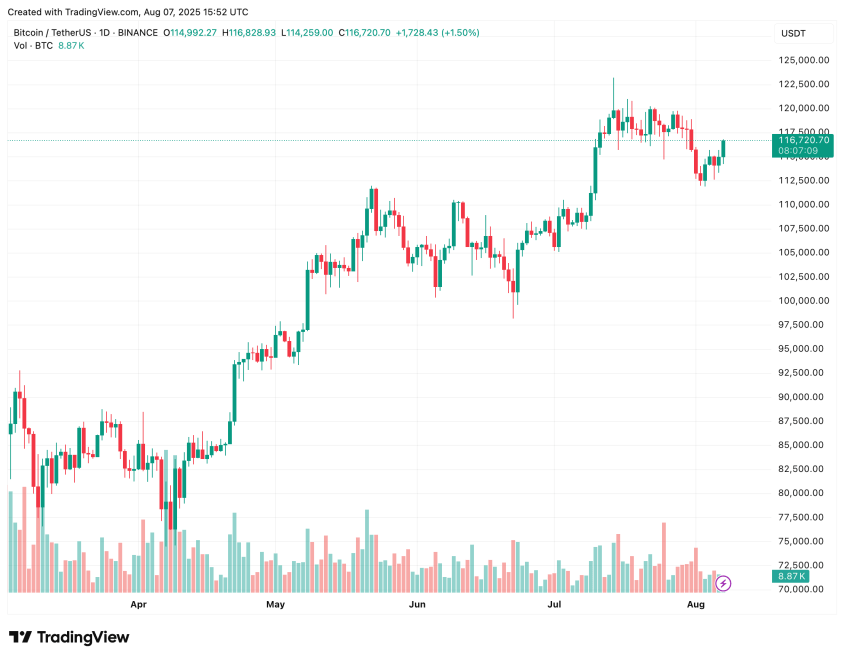India Escalates Crypto Tax Enforcement With Over 44,000 Notices To Traders

India’s Income Tax Department has intensified its efforts to curb tax evasion in the cryptocurrency sector, sending more than 44,000 notices to traders who failed to disclose their virtual digital asset (VDA) transactions in their income tax returns.
Indian Tax Watchdog Ups The Ante
In a recent session of the Rajya Sabha (Upper House of the Parliament), India’s Minister of State for Finance, Pankaj Chaudhary, revealed that the Central Board of Direct Taxes (CBDT) had launched enforcement actions against non-compliant crypto users. These include reassessment notices, surveys, and search-and-seizure operations under the Income Tax Act, 1961.
To promote voluntary compliance, the CBDT has initiated targeted awareness efforts through its NUDGE campaign (Non-Intrusive Usage of Data to Guide and Enable). Under this program, a total of 44,057 emails and messages were issued to individuals who were found to be investing or trading in crypto assets but had not reported these transactions in their tax filings.
The Indian government introduced a tax on digital asset income starting in the 2022-23 financial year. Since then, taxpayers have reported approximately ₹705 crore ($80.6 million) in crypto-linked income for FY 2022-23 and 2023-24 combined.
However, enforcement actions such as surveys and raids led to the discovery of an additional ₹630 crore ($72 million) in undisclosed income related to cryptocurrencies. It’s worth noting that accusations of tax evasion have been directed not only at individual taxpayers, but also at crypto exchanges.
Notably, the CBDT is leveraging data analytics tools such as Non-Filer Monitoring System (NFMS), Project Insight, and its internal databases to increase oversight of crypto transactions. The report adds:
These tools help cross-reference information provided in tax filings with actual transactions reported by Virtual Asset Service Providers (VASPs) via TDS returns. Discrepancies identified through this system are followed up with enforcement actions to ensure accurate reporting and recovery of tax dues.
Uncertainty Plagues India’s Crypto Ecosystem
While India ranks among the top countries globally for crypto adoption, its taxation and regulatory stance have been a point of contention. The combination of a 30% tax on crypto profits and a 1% TDS on every trade has discouraged many retail traders and investors.
As a result, a number of crypto exchanges in India have reported dwindling trading volumes, leading to businesses announcing layoffs or getting shut. Earlier this year, crypto exchange Bybit announced it was temporarily halting its operations in India due to lack of regulatory clarity.
In contrast, neighbouring country Pakistan has shown a more receptive approach toward digital assets. Earlier this year, the South Asian country stated that it would tap excess energy to mine more BTC.
Similarly, the UAE continues to cement its place as the global hub for crypto businesses. In November 2024, the nation eliminated Value Added Tax from all transactions in cryptocurrency exchanges and conversions.
Despite these challenges, there are signs that India may be reassessing its approach. In July 2025, Pradeep Bhandari, spokesperson for the Bharatiya Janata Party (BJP), called on the government to explore creating a national Bitcoin reserve, suggesting potential long-term interest in integrating crypto into the financial system.
Adding to the momentum, Coinbase, the largest US-based crypto exchange, is set to re-enter the Indian market later this year, signaling that global firms remain optimistic about India’s long-term crypto potential, even amid short-term uncertainty. At press time, BTC trades at $116,720, up 1.2% in the past 24 hours.

Featured image from Unsplash.com, chart from TradingView.com

Editorial Process for bitcoinist is centered on delivering thoroughly researched, accurate, and unbiased content. We uphold strict sourcing standards, and each page undergoes diligent review by our team of top technology experts and seasoned editors. This process ensures the integrity, relevance, and value of our content for our readers.
